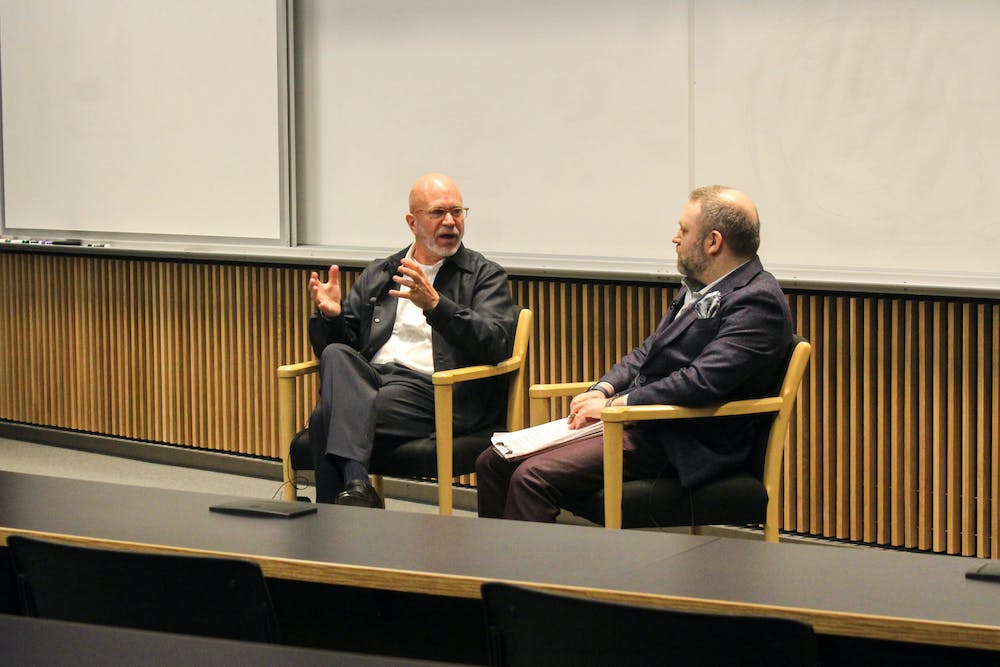Radio host Michael Smerconish spoke at the Perelman Center for Political Science and Economics for a conversation hosted by the SNF Paideia and Red and Blue Exchange Program on Oct. 2. Credit: Victoria Navarrete-Ortiz
Smerconish is the host of Smerconish on CNN and the host of his daily radio show on SiriusXM. He is regarded as “one of the few voices in the media who can’t be pigeonholed ideologically,” according to the event description on the Paideia website.
Political historian and 2006 College graduate Brian Rosenwald, who is also a scholar in residence at the College of Liberal and Professional Studies, moderated the event. Rosenwald asked Smerconish various questions surrounding his upbringing, political opinions, and the media’s role in American polarization.
Smerconish spoke about how he grew up in Pennsylvania and was brought into the world of politics when his father decided to run for a seat in the Pennsylvania State Legislature in the spring of his senior year of high school.
“I became totally caught up in his campaign. I accompanied him everywhere, stood at grocery stores and handed out rulers that had our name on them, and so forth. I was totally taken with the whole process,” said Smerconish.
While in law school, Smerconish said he remained “active in Republican politics” and transitioned his way into media work.
“I was contacted by one of the local network affiliates to be a talking head on an election and the ego of it consumed me. I also thought I had a skill set for it, and I just hung with it,” Smerconish shared.
Rosenwald then shifted the discussion to focus on Smerconish’s identity as an independent and what this means in his role in the media. When asked what it was like to be “the guy in the middle,” Smerconish said, “lonely.”
“I think there’s a perception that if you’re not one or the other, then you’re blank and you’re lacking in personality and opinion. I have plenty of opinions, they just don’t stack up into some faux ideological boxes that when you really think about them, there’s no connection to them anyway,” Smerconish said.
Smeroncish also shared personal stories and opinions on how the media is shaping the American political system and the sense of polarization that is being felt by many Americans today.
“When Fox and MSNBC came online, in the mid-’90s, they took a page out of what was going on in the world of talk radio and it was immensely successful from a business standpoint. But it took the political audience and politicians in a very, very ideologically driven direction,” Smerconish said.
Rosenwald also asked Smerconish to explain whether he believed the cable media was serving Americans well. Smerconish’s response attributed the problem of polarization not only to the media itself, but its viewers as well.
“I’ll say that the cable media, of which I’m a member, is not serving us well. But it’s also the fault of people who have so much choice and are lazy. I mean, my God, we have never had as much opportunity to absorb so much content as we do today,” Smerconish said.
Smerconish also shared his thoughts on the importance of giving platforms to individuals on all sides of the political spectrum, adding how he interviews guests on his own show and features stories in his newsletters that showcase all perspectives.
“I try to give people what I think we most need, which is a balanced media diet,” he said.
Smerconish is not the first national figure to speak at an SNF Paideia event. Last month, former United States Senator Richard Burr discussed artificial intelligence and health care policy. In April 2022, former National Security Advisor John Bolton spoke to students about his relationship with former president and 1968 Wharton graduate Donald Trump.

